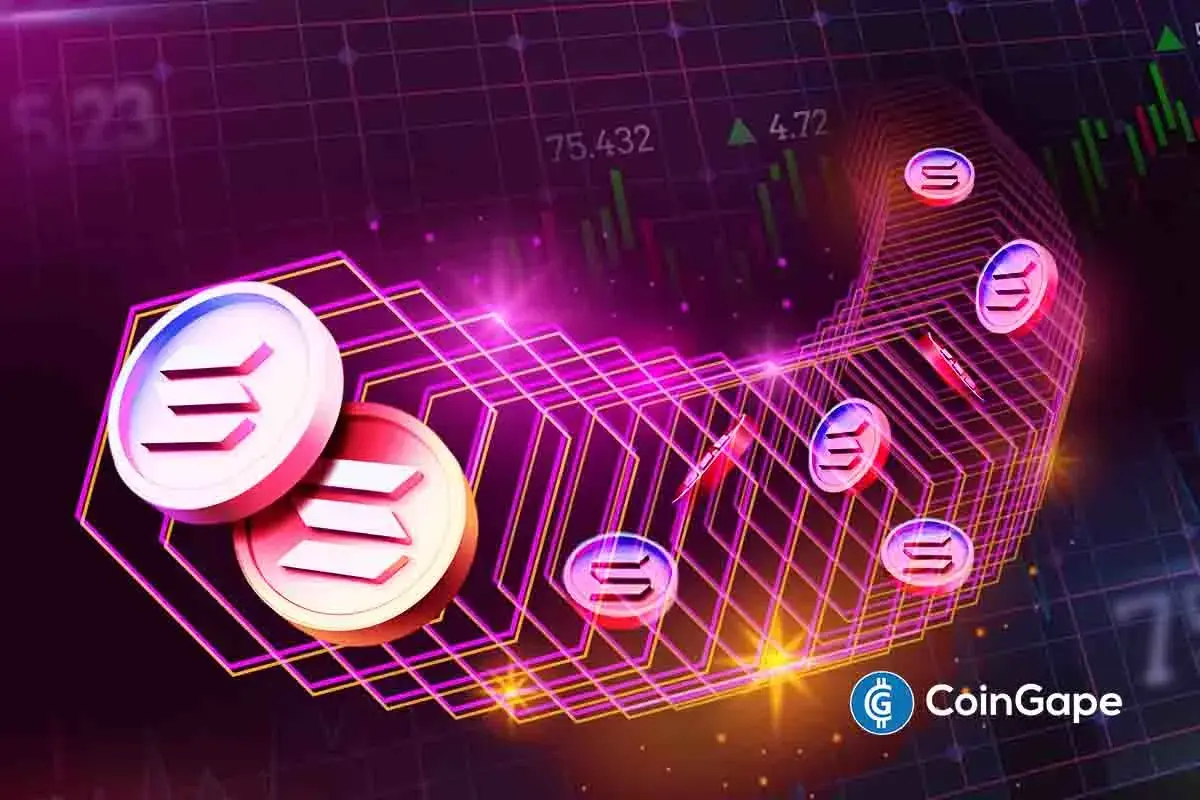Market
Helium Eyes Energy Sector, and More

Decentralized Physical Infrastructure Networks (DePin) are transforming the tech by enabling decentralized projects in real-world infrastructure.
Here’s what happened recently in the DePin sector: World Mobile surpassed 100,000 daily users, A Swedish energy project called Srcful proposed becoming a Helium subnetwork, Crust has partnered with Xcavate to provide better decentralized storage solutions for real estate tokenization.
The World Mobile Network Surpasses 100,000 Unique Daily Users
World Mobile, the global blockchain-based wireless network, has hit a major milestone by surpassing 100,000 unique daily users. This achievement marks a 400% increase in unique daily users over the past year.
The network’s expansion across Africa, Asia, and the USA has played a crucial role in this growth. Notably, World Mobile has deployed 1,798 AirNodes globally, including five in the USA, 680 in Zanzibar, and 1,113 in Pakistan. This achievement positions World Mobile as the largest network by unique users in the wireless DePIN category.
“Over 100,000 daily customers across three continents, connecting to 1,846 AirNodes. One unifying mission, driving one visionary team, powered by one pioneering community,” the team wrote on X.
Read more: What Is World Mobile?

The network supports its participants through World Mobile Token (WMT). All transactions on the network, including calls, data usage, and wallet transactions, are paid out in WMT to node operators and token stakers. This system ensures that participants are rewarded and incentivized, nurturing an engaged and active user base.
Following the announcement of this milestone, World Mobile has shared an ambitious roadmap for the rest of 2024. Plans include further global AirNode deployments, additional AirNode sales, and a token migration to Base, Ethereum, and BNB Chain.
Helium Eyes Energy Sector
On July 1, the Helium Foundation hinted at new “subnetworks” in a blog post, suggesting they would go “beyond wireless.” People speculated these might involve proof-of-location or decentralized computing.
A few days ago, the mystery was solved. A Swedish energy project called Srcful proposed becoming a Helium subnetwork with its own ENERGY token.
A proposed firmware upgrade would let existing Helium IoT hotspots also support Srcful. This would expand the network’s usefulness and provide another way to earn tokens. The proposal also mentions special “gateways” that could act as hotspots, requiring vendors to stake 50 million ENERGY tokens to sell them.
Read more: What Is DePIN (Decentralized Physical Infrastructure Networks)?
If the governance vote passes, Srcful plans to use Helium hotspots to run a virtual power plant (VPP). A VPP combines small energy sources, like household solar panels and batteries, to support the energy grid.
In Srcful’s plan, households would share power from their solar panels or batteries, earning ENERGY tokens in return. Helium hotspots would manage these panels and batteries, and hotspot operators would also get rewards.
Srcful would then sell the VPP’s energy to clients like energy companies or grid operators, aiming to generate revenue to sustain the project.
Crust Network to Deliver a New Storage for Real Estate Tokenization
Crust Network has partnered with Xcavate to provide better decentralized storage solutions for real estate tokenization. With Crust Network’s help, Xcavate can store property data securely and in a decentralized way.
This partnership offers:
- Secure Storage: Crust’s decentralized network keeps all real estate data safe, preventing single points of failure and improving data integrity.
- Trustless Environment: Crust’s storage capabilities combined with Xcavate’s tokenization protocol create a secure and trustworthy system for users.
- Scalability: Crust’s storage solutions can handle large amounts of property data efficiently, supporting Xcavate’s goal of making real estate accessible worldwide.
This collaboration is a big step toward Xcavate’s mission of democratizing real estate investments. By using Crust’s decentralized storage, Xcavate ensures property data is secure, unchangeable, and easily accessible, boosting trust and transparency in real estate tokenization.
Read more: How To Invest in Real-World Crypto Assets (RWA)?
Prophecy Market Insights predicts the global real estate tokenization market will grow at a compound annual growth rate (CAGR) of 2.90% from 2024 to 2034. They expect market revenue to increase from $3.8 billion in 2024 to $26 billion by 2034.
These developments indicate a promising future for DePIN, with more prominent players entering the sector and new solutions emerging. While DePIN is still in its early stages and has some flaws, it allows for the exchange of tokens between synthetic and real-world assets. This supports traditional infrastructure by providing last-mile coverage in areas where conventional models are not economically feasible.
Disclaimer
In adherence to the Trust Project guidelines, BeInCrypto is committed to unbiased, transparent reporting. This news article aims to provide accurate, timely information. However, readers are advised to verify facts independently and consult with a professional before making any decisions based on this content. Please note that our Terms and Conditions, Privacy Policy, and Disclaimers have been updated.
Market
How Will it Impact OM Price?

MANTRA CEO, JP Mullin, is burning 150 million OM tokens from his own allocation and engaging other ecosystem partners to burn an additional 150 million tokens. This 300 million OM token burn aims to restore investor trust in the project and stabilize the altcoin’s price dynamics.
OM is attempting to recover from one of the most dramatic crashes in recent crypto history. On April 13, it lost over 90% of its value in a single hour. The collapse, which erased more than $5.5 billion in market cap, triggered widespread accusations of insider activity and manipulation within the Real-World Assets (RWA) sector.
Understanding MANTRA’s Token Burn
Mantra, once one of the biggest players in the Real-World Assets (RWA) sector, suffered a dramatic collapse on April 13, with its token crashing over 90% in less than an hour and wiping out more than $5.5 billion in market capitalization.
The plunge followed a rapid surge earlier this year, when OM rose from $0.013 to over $6, pushing its fully diluted valuation to $11 billion. The crash was reportedly triggered by a $40 million token deposit into OKX by a wallet allegedly linked to the team, sparking fears of insider selling.
Panic spread quickly as rumors of undisclosed OTC deals, delayed airdrops, and excessive token supply concentration fueled mass liquidations across exchanges.
Despite co-founder John Patrick Mullin denying any wrongdoing and blaming centralized exchanges for forced closures, investors and analysts raised concerns about potential manipulation by market makers and CEXs, drawing comparisons to past collapses like Terra LUNA.

In an effort to rebuild trust, Mullin has announced the permanent burn of his 150 million OM team allocation. The tokens, originally staked at mainnet launch in October 2024, are now being unbonded and will be fully burned by April 29, reducing OM’s total supply from 1.82 billion to 1.67 billion.
This move also lowers the network’s staked amount by 150 million tokens, which could impact on-chain staking APR.
Additionally, MANTRA is in talks with partners to implement a second 150 million OM burn, potentially cutting the total supply by 300 million tokens.
OM Price Faces Critical Test as Token Burn Battles Lingering Market Doubt
Despite MANTRA’s ongoing token burn efforts, it’s still uncertain whether the move will be enough to fully restore investor confidence in OM.
From a technical standpoint, if momentum begins to recover, OM could test the immediate resistance at $0.59. A successful breakout at that level may pave the way for further gains toward $0.71, with additional key hurdles at $0.89 and $0.997 standing between the token and a return to the psychologically important $1 mark.
However, reclaiming these levels will likely require sustained buying interest and broader sentiment recovery across the Real-World Assets (RWA) sector.

On the downside, if the token burn fails to shift sentiment or if selling pressure continues, OM risks resuming its decline.
The first key support lies at $0.51, and a breakdown below that level could send the price further down to $0.469.
Given the scale of the recent crash and the lingering distrust among investors, the path to recovery remains fragile—OM now sits at a critical crossroads between a potential rebound and further erosion of its market value.
Disclaimer
In line with the Trust Project guidelines, this price analysis article is for informational purposes only and should not be considered financial or investment advice. BeInCrypto is committed to accurate, unbiased reporting, but market conditions are subject to change without notice. Always conduct your own research and consult with a professional before making any financial decisions. Please note that our Terms and Conditions, Privacy Policy, and Disclaimers have been updated.
Market
Strategy’s 12% YTD Yield and $555M Acquisition

Welcome to the US Morning Crypto News Briefing—your essential rundown of the most important developments in crypto for the day ahead.
Grab a coffee to see what experts say about Bitcoin’s (BTC) price amid recovery efforts. The status of Bitcoin as a hedge against inflation and economic uncertainty is progressively becoming questionable, with institutional influence adding to the concerns.
Can Strategy’s $555 Million BTC Purchase Send Bitcoin Past $90,000?
Michael Saylor, the chairman of Strategy (formerly MicroStrategy), revealed the firm’s latest Bitcoin purchase, comprising 6,556 BTC tokens worth approximately $555.8 million. With this, the firm has attained a Bitcoin yield of 12.1% year-to-date (YTD) in 2025.
“MSTR has acquired 6,556 BTC for ~$555.8 million at ~$84,785 per bitcoin and has achieved BTC Yield of 12.1% YTD 2025. As of 4/20/2025, Strategy holds 538,200 BTC acquired for ~$36.47 billion at ~$67,766 per bitcoin,” Saylor shared.
Strategy uses the Bitcoin Yield YTD to measure the BTC holdings per share increase. This model has been a key part of their financial strategy firm since their first Bitcoin purchase in August 2020.
This acquisition aligns with a bullish market sentiment for Bitcoin, which is steadily nearing the $90,000 milestone, as the recent US Crypto News indicated.

Despite a mild recovery in Bitcoin prices this week, up by over 3% in the last 24 hours, it is worth noting that Bitcoin is highly sensitive to economic indicators.
Similarly, the global market is highly sensitive to monetary policies set by major economies, particularly the US. BeInCrypto contacted Paybis founder and CEO Innokenty Isers for insights on the current market outlook, particularly for Bitcoin.
“Given the strong concentration of investors in technology stocks, shifts in trade policies and government interventions that influence key indices like the Nasdaq Composite create ripple effects across financial markets,” Isers told BeInCrypto.
According to the Pybis executive, since the US Presidential inauguration, the outlook of Bitcoin has changed from a trusted hedge against inflation to a more risk-on asset.
“With its relatively higher volatility, risk-averse investors may favor alternative inflation hedges instead of Bitcoin,” he added.
Iners expressed cognizance of the longer stretch of the trade war and the potential inflation that will emerge. Based on this, he noted that capital allocation to Bitcoin as a hedge against economic instability might be reduced.
Strategy’s Stock Premium Narrows as Bitcoin Hype Cools
Meanwhile, Strategy has seen a significant shift in its stock valuation dynamics over the past year. Saylor recently revealed that as of Q1 2025, over 13,000 institutions and 814,000 retail accounts held MSTR directly.
“An estimated 55 million beneficiaries have indirect exposure through ETFs, mutual funds, pensions, and insurance portfolios,” Saylor added.
According to data on Bitcointreasuries.net, the premium investors once paid for exposure to its Bitcoin holdings has notably narrowed.
Specifically, the NAV multiplier, a measure of how much the stock trades above the value of Strategy’s Bitcoin assets, has decreased compared to last year. This indicates that MSTR is now trading closer to the actual value of its Bitcoin reserves.
In 2024, investors were willing to pay a substantial premium for MSTR shares, driven by Bitcoin’s hype and MicroStrategy’s aggressive accumulation strategy.
“I don’t know if buying strategy equity is a good idea for the government. The stock would just pump, and it’s likely trading at a premium over NAV with a higher risk profile. Also, I believe the gov will find it difficult to find institutions that would be willing to sell their BTC in large quantities,” an analyst said recently.
The shrinking NAV multiplier suggests a more cautious market sentiment. Analysts believe this reflects a shift toward valuing MicroStrategy based on its fundamentals rather than speculative Bitcoin enthusiasm.
This suggests a maturing market approach to the company’s unique investment strategy.
Chart of the Day

This chart shows how Strategy’s stock price (blue) moves with Bitcoin price (orange). When Bitcoin goes up, MicroStrategy usually follows, but it swings even more.
However, the NAV multiplier has narrowed compared to last year, meaning MicroStrategy’s stock is now trading closer to the actual value of its Bitcoin holdings.
Last year, investors paid a bigger premium for exposure to MSTR, but that gap has shrunk. This suggests a more cautious sentiment or a shift toward valuing the company based on fundamentals rather than just Bitcoin hype.
Byte-Sized Alpha
- Bitcoin ETFs saw modest $15 million inflows, a shift from the previous $713 million outflows, but the smallest influx of 2025, signaling cautious investor sentiment.
- XRP’s futures market shows a bullish shift with long positions exceeding short bets, signaling potential price increases.
- Accumulation signals from whale activity and consolidation at $0.60 indicate a possible rally for Pi Network, despite concerns about the lack of exchange listings and use cases.
- Solana surpasses Ethereum in staking market cap with $53.15 billion, driven by higher staking yield and 65% of supply staked.
- Bitcoin whales accumulated 53,652 BTC worth $4.7 billion in a month, pushing the price to $87,463, but long-term holder profits hit a two-year low.
- PlanB criticizes Ethereum as centralized and pre-mined, citing PoS, tokenomics, and a flexible supply as key red flags.
- Decentraland’s (MANA) price has surged over 10% in 24 hours, hitting a two-month high of $0.31.
Crypto Equities Pre-Market Overview
| Company | At the Close of April 17 | Pre-Market Overview |
| Strategy (MSTR) | $317.20 | $323.49 (+1.98%) |
| Coinbase Global (COIN) | $175.03 | $175.85 (+0.46%) |
| Galaxy Digital Holdings (GLXY.TO) | $15.36 | $15.12 (-1.41%) |
| MARA Holdings (MARA) | $12.66 | $12.83 (+1.34%) |
| Riot Platforms (RIOT) | $6.49 | $6.52 (+0.54%) |
| Core Scientific (CORZ) | $6.61 | $6.59 (-0.27%) |
Disclaimer
In adherence to the Trust Project guidelines, BeInCrypto is committed to unbiased, transparent reporting. This news article aims to provide accurate, timely information. However, readers are advised to verify facts independently and consult with a professional before making any decisions based on this content. Please note that our Terms and Conditions, Privacy Policy, and Disclaimers have been updated.
Market
PI Token Price Faces Bearish Pressure, Risking a Drop to $0.40

PI has been on a steady downtrend since February 26, shedding 72% of its value as bearish sentiment continues to weigh on the token.
Bearish pressure continues to mount on the PI token, suggesting that it may be poised to enter a new phase of decline.
PI Network Risks Fresh Decline
An assessment of the PI/USD one-day chart reveals that token holders remain steadfast in their distribution. At press time, PI’s Balance of Power (BoP) is negative, reflecting the selling pressure in the market.
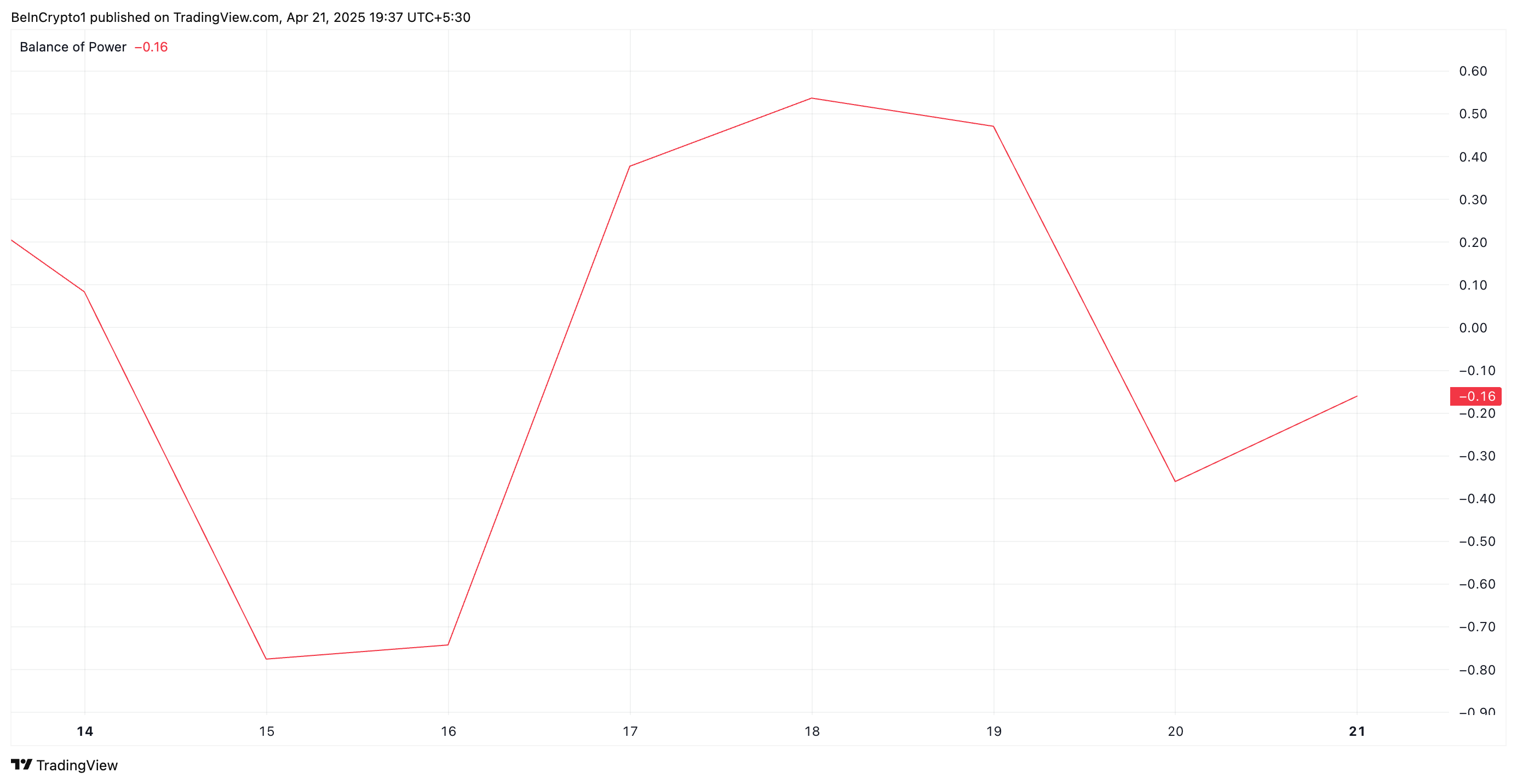
The BoP indicator measures the strength of buying versus selling pressure by comparing the close price to the trading range within a given period. When BOP is negative like this, it indicates that sellers are dominating the market, suggesting downward pressure on the asset’s price.
Further, the setup of PI’s Chaikin Money Flow (CMF) supports this bearish outlook. At press time, this is below the central line at -0.12.
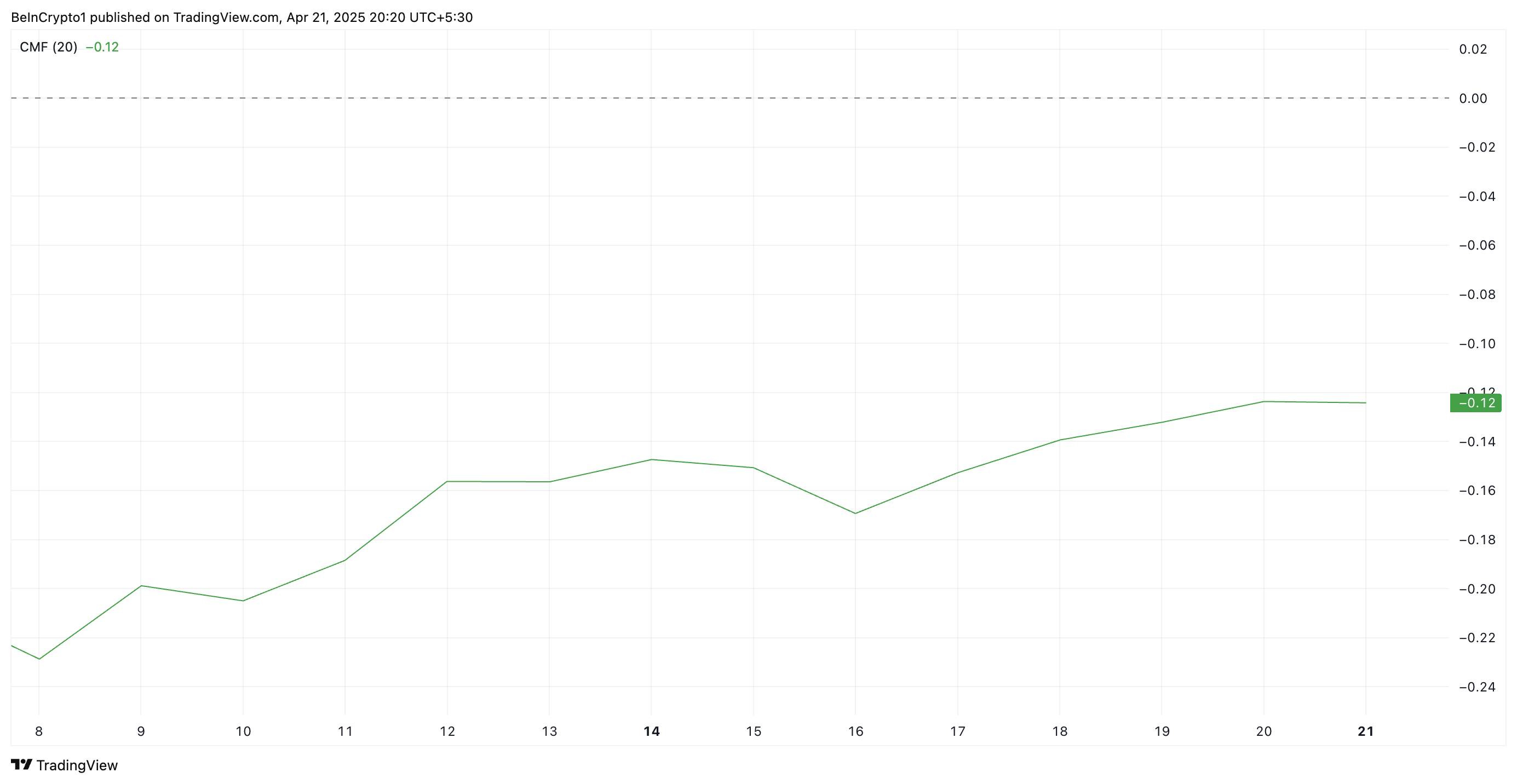
The CMF indicator measures an asset’s buying and selling pressure. A negative CMF reading suggests that the asset is experiencing more selling pressure than buying pressure. This means PI traders are distributing rather than accumulating. This signals bearish sentiment and confirms the downward momentum in the token’s price.
Sellers Tighten Grip on PI, But Recovery to $1.01 Still on the Table
At press time, PI trades at $0.63, below the dynamic support formed above it at $0.93 by its Super Trend indicator.
The Super Trend indicator helps traders identify the market’s direction by placing a line above or below the price chart based on the asset’s volatility.
When an asset’s price trades below the Super Trend line like this, it signals a bearish trend and hints at potential decline. If PI’s decline strengthens, it could revisit its all-time low of $0.40.
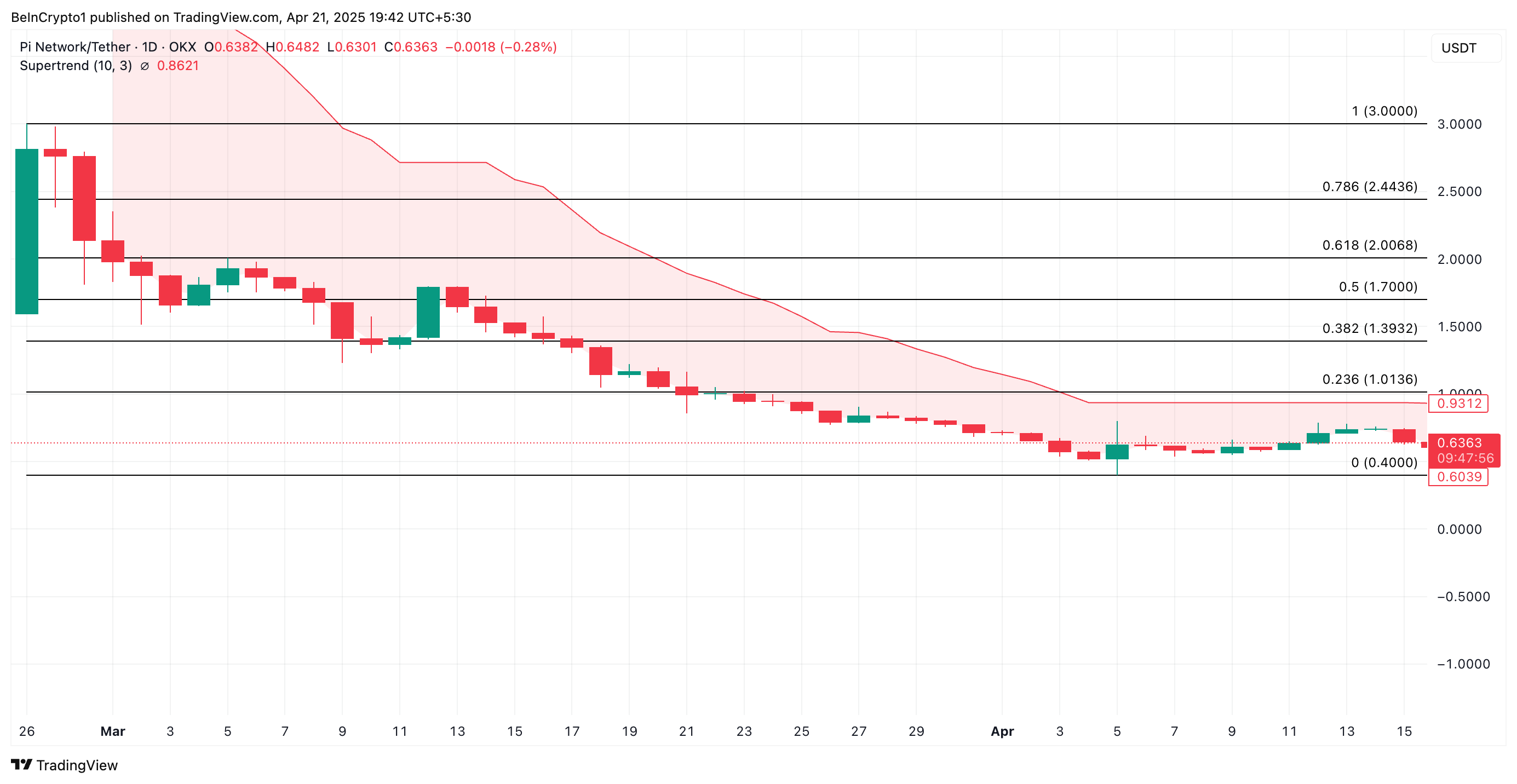
However, if demand returns to the PI market, its price could break above the resistance at $0.86 and surge to $1.01.
Disclaimer
In line with the Trust Project guidelines, this price analysis article is for informational purposes only and should not be considered financial or investment advice. BeInCrypto is committed to accurate, unbiased reporting, but market conditions are subject to change without notice. Always conduct your own research and consult with a professional before making any financial decisions. Please note that our Terms and Conditions, Privacy Policy, and Disclaimers have been updated.
-

 Market24 hours ago
Market24 hours agoDogecoin Defies Bullish Bets During Dogeday Celebration
-

 Market22 hours ago
Market22 hours agoWill XRP Break Support and Drop Below $2?
-

 Bitcoin12 hours ago
Bitcoin12 hours agoUS Economic Indicators to Watch & Potential Impact on Bitcoin
-
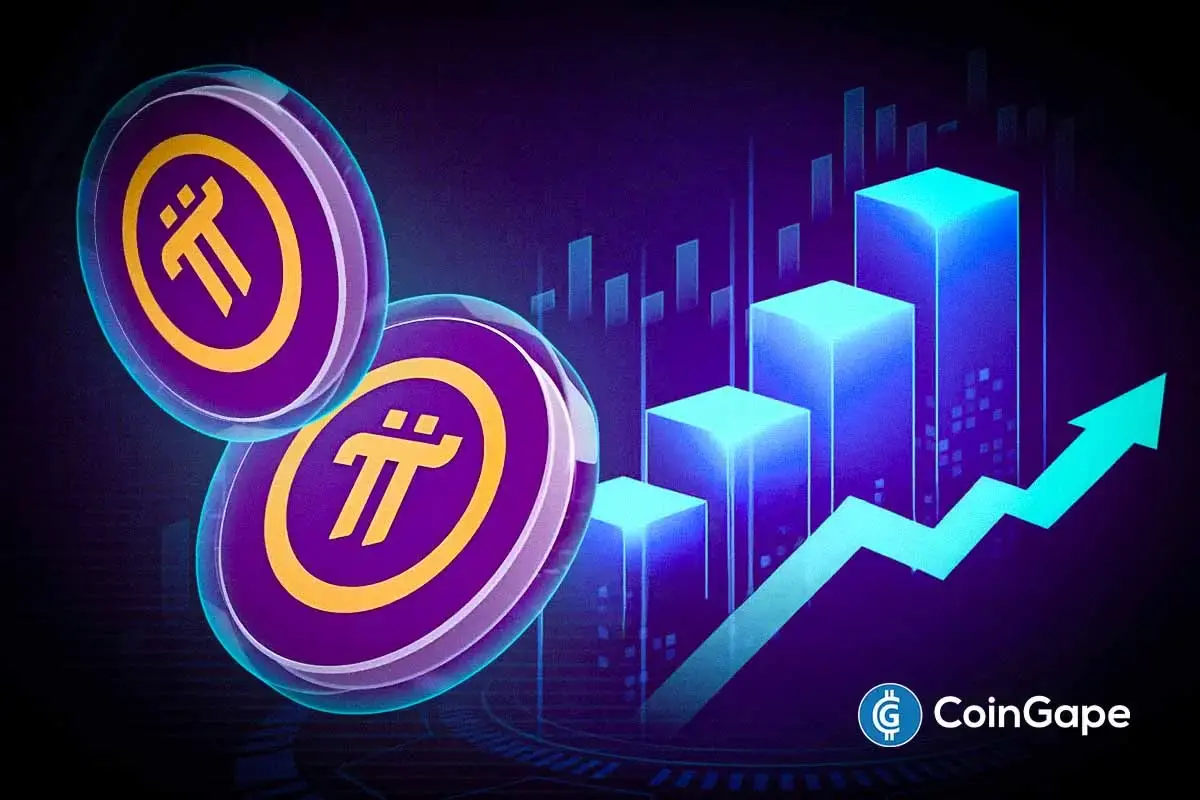
 Altcoin24 hours ago
Altcoin24 hours agoExpert Predicts Pi Network To Reach $5 As Whales Move 41M Pi Coins Off Exchanges
-

 Bitcoin21 hours ago
Bitcoin21 hours agoBitcoin LTH Selling Pressure Hits Yearly Low — Bull Market Ready For Take Off?
-

 Bitcoin18 hours ago
Bitcoin18 hours agoHere Are The Bitcoin Levels To Watch For The Short Term
-

 Market14 hours ago
Market14 hours agoBitcoin Price Breakout In Progress—Momentum Builds Above Resistance
-
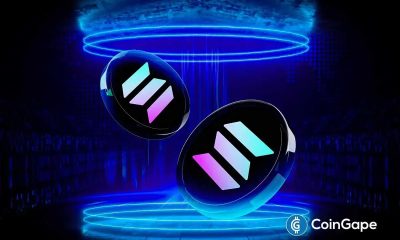
 Altcoin14 hours ago
Altcoin14 hours agoExpert Says Solana Price To $2,000 Is Within Reach, Here’s How



















